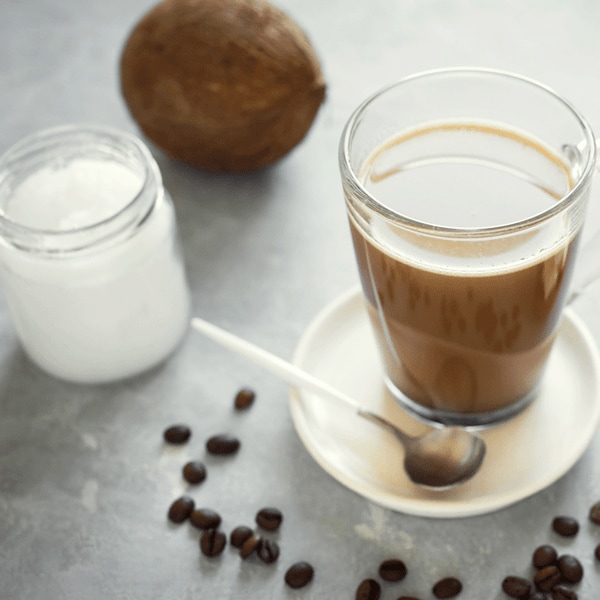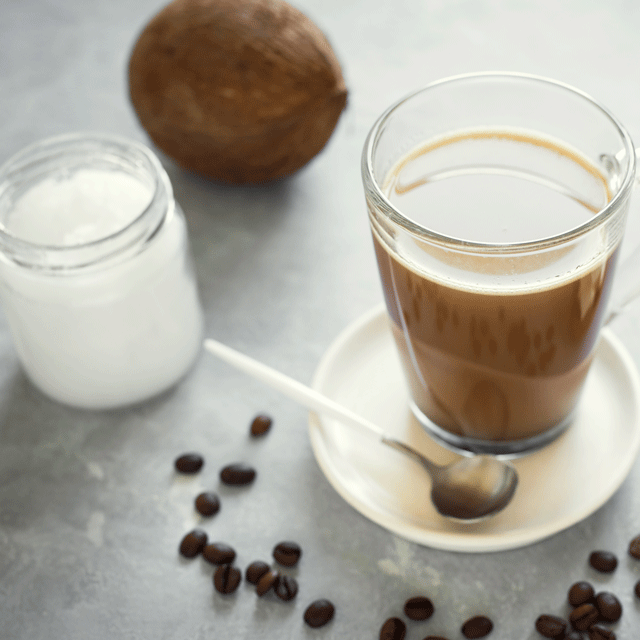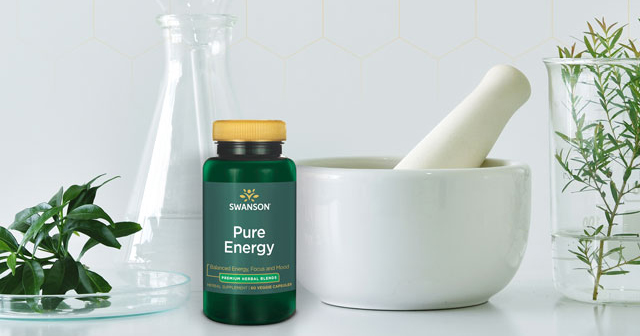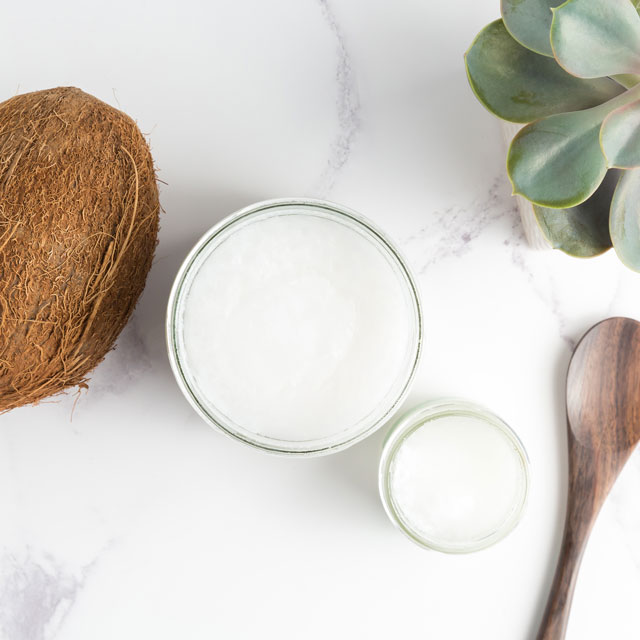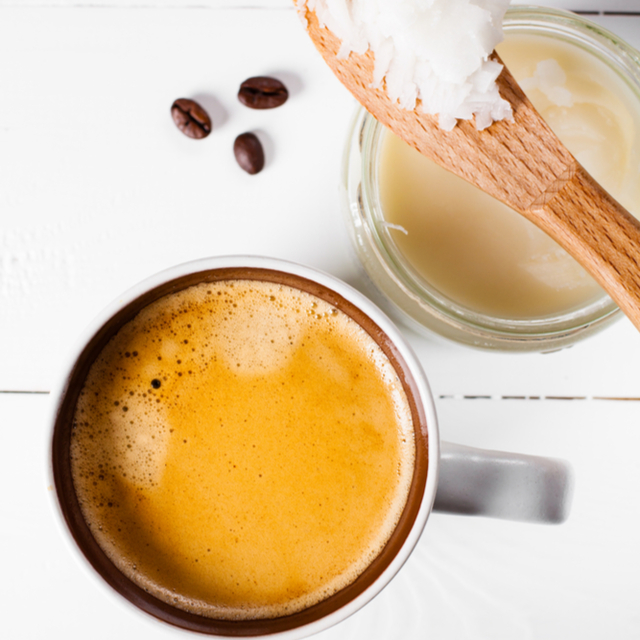Coconut Oil in Coffee: The Benefits of Adding MCTs to Your Brew
There’s nothing like a cup of coffee to kick-start your morning and give you the energy you need to face the day. The trouble is that most coffees are only able to provide you with a short jolt before you crash and end up feeling tired all over again. The good news is, health enthusiasts have discovered an ingenious and exciting hack to help you get more out of your cup of coffee. Not only does this hack help extend your energy boost, but it’ll add a little flavor while boasting some pretty impressive health and wellness benefits. Their secret? MCT-rich coconut oil. Get excited, because this will definitely up your coffee game.
What is MCT Oil?
MCT Oil is an oil made from medium chain-triglycerides, which are a type of fat that can be found in dairy products and in particularly high concentrations in palm kernel oil and coconut oil.1 Medium-chain triglycerides get their name from the fact that they are made up from 6 to 12 carbon atoms, as opposed to the 13 to 21 carbon atoms that make up long-chain fatty acids.2 Medium-chain fatty acids are processed differently by the body than long-chain fatty acids and are broken down by the gut and the liver where they are converted into ketones which are used by the body to promote energy.2
Coconut Oil Coffee Benefits
Adding coconut oil to your coffee gives it a light, nutty flavor and a smooth texture and is a healthy alternative to the many coffee creamers out there. And it fits right into the daily routine of keto diet enthusiasts. Here are some of the benefits of adding coconut oil to your cup of joe.
Supports a Healthy Weight
When combined with a healthy diet and exercise routine, adding coconut oil to your coffee can be a great way to boost your healthy weight regimen. There are multiple ways in which coconut oil has been scientifically studied for its weight-management potential. For example, coconut oil raises levels of peptide YY and leptin within the body, which supports satiety and may result in decreased food consumption.3 Further, MCTs have been shown by researchers to support an increase in the amount of fat and calories that are burned for energy.4 Not only that, but MCTs provide an instant energy boost, lessening the need for the body to store fat.5
Boosts Brain Function
Can adding coconut oil to your coffee make your brain sharper? Studies seem to indicate that it can. According to these studies, aging adults brains’ ability to use ketones for energy was significantly better than their ability to use glucose for the same purpose.6 But aging adults are hardly the only people who can benefit greatly from the brain-boosting effects of MCT oil. That’s because MCTs are able to cross the blood-brain barrier once they are broken down by the liver, which supports brain cell energy. Ketones might also be able to enhance the activation of brain-derived neurotrophic growth factor (BDNF), which is a protein that helps protect brain cells and stimulate the production of healthy neurons.7,8
Promotes Energy and Athletic Performance
Not only is coconut oil a great source of fuel for your brain, but it also helps to boost energy throughout the entire body. Furthermore, when added to coffee coconut oil helps the body sustain the caffeine’s effect for a longer-lasting period of time. Researchers have noted that coconut oil not only helps increase fat burning during exercise but also helps individuals boost athletic endurance during high-intensity workouts.9
It’s Keto Diet Friendly
Featuring just coffee and coconut oil and an optional keto-friendly sweetener, such as stevia or monk fruit, coconut coffee goes perfectly with your keto diet.
How to Use MCT Oil in Coffee
Coconut oil coffee is easy to make. Simply brew a cup of your favorite coffee—preferably an organic and sustainably sourced coffee blend—and add between a teaspoon and tablespoon of extra virgin coconut oil or liquid coconut oil. Then mix well in a blender, food processor or immersion blender until frothy, then enjoy.
More Coffee Hacks to Enhance Your Brew
If you’re looking to add a little more flair to your coffee, there are many cool and healthy tricks to add some extra flavor. Here are a few of my favorites:
- Add Spices: Just a little bit of spice like cinnamon or nutmeg sprinkled on top of your daily brew can add a delicious infusion of flavor
- Make Your Own Flavored Creamer: It’s easy, all you need is milk or a milk substitute like cashew milk or almond milk and a sweetener of your choice, and you’ve got your own homemade creamer.
- DIY Coffee Syrup: Mix 1 part turbinado sugar and 1 part water and boil until fully dissolved, then flavor with extracts and spices if desired, cool completely, then use a funnel to pour into a bottle with a pour spout.
- Give Your Beans a Flavor Enhancement: Infuse coffee beans with flavor by simply storing them with vanilla beans, organic cinnamon sticks, orange peels, etc.
So there you have it, a new and healthy twist on getting your daily coffee buzz. Although you may want to experiment further with other coffee types like butter coffee, coconut oil coffee is an easy and beneficial way to add something new and healthy to your morning and kick start a new day on your health and wellness journey.
If you enjoyed this article, you might also like 2019 Wellness Trends for Crushing Your Resolutions and What’s the Buzz About Coffee and Caffeine? Also, be sure to sign up for Swanson Health Emails to get expert advice and our best promotions delivered straight to your inbox.

About Lindsey Toth, MS, RD
Registered Dietitian, Swanson Health Products
Lindsey is a nationally recognized registered dietitian and nutritionist with a soft spot for pie. She empowers people to take charge of their health by finding the balance between the pleasure and nourishment in food.
Her philosophy is that you should take care of your body because it’s the only permanent home you have. It’s what inspired her to pursue a career in nutrition and, ultimately, led her to Swanson Health.
Sources
1 Sources of Medium-Chain Triglycerides. Healthline. https://www.healthline.com/nutrition/mct-oil-101#section3
2 What are the Possible Benefits of MCT Oil? Medical News Today. https://www.medicalnewstoday.com/articles/320251.php
3 Impact of Medium and Long Chain Triglycerides Consumption on Appetite and Food Intake in Overweight Men. US National Library of Medicine National Institutes of Health. https://www.ncbi.nlm.nih.gov/pmc/articles/PMC4192077/
4 Medium-Chain Triglycerides Increase Energy Expenditure and Decrease Adiposity in Overweight Men. Wiley Online Library. https://onlinelibrary.wiley.com/doi/full/10.1038/oby.2003.53
5 Weight-Loss Diet that Includes Consumption of Medium-Chain Triacyloglycerol Oil Leads to a Greater Rate of Weight and Fat Mass Loss than does Olive Oil. US National Library of Medicine National Institutes of Health. https://www.ncbi.nlm.nih.gov/pubmed/18326600
6 Can Ketones Compensate for Deteriorating Brain Glucose Uptake During Aging? Implications for the Risk and Treatment of Alzheimer’s Disease. Annals of the New York Academy of Sciences. https://nyaspubs.onlinelibrary.wiley.com/doi/full/10.1111/nyas.12999
7 Mechanisms of Ketogenic Diet Action. US National Library Medicine. https://www.ncbi.nlm.nih.gov/books/NBK98219/#masino.s15
8 Brain-derived Neurotrophic Factor. US National Library of Medicine National Institutes of Health. https://www.ncbi.nlm.nih.gov/pmc/articles/PMC2504526/
9 Effect of Ingestion of Medium-Chain Triacylglycerols on Moderate and High-Intensity Exercise in Recreational Athletes. US National Library of Medicine National Institutes of Health. https://www.ncbi.nlm.nih.gov/pubmed/19436137
*These statements have not been evaluated by the Food and Drug Administration. These products are not intended to diagnose, treat, cure or prevent any disease.
